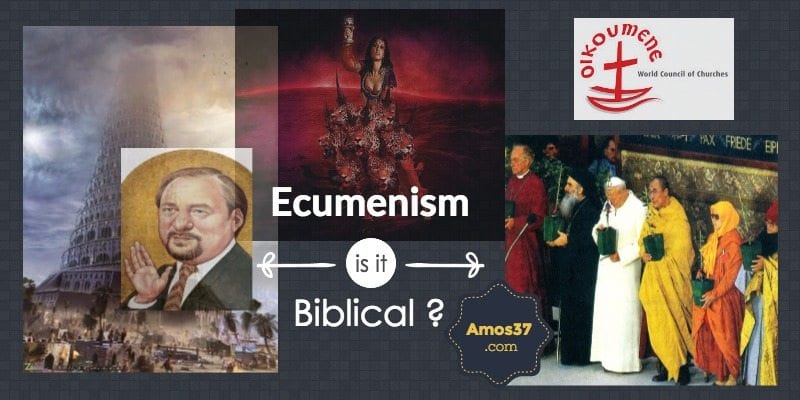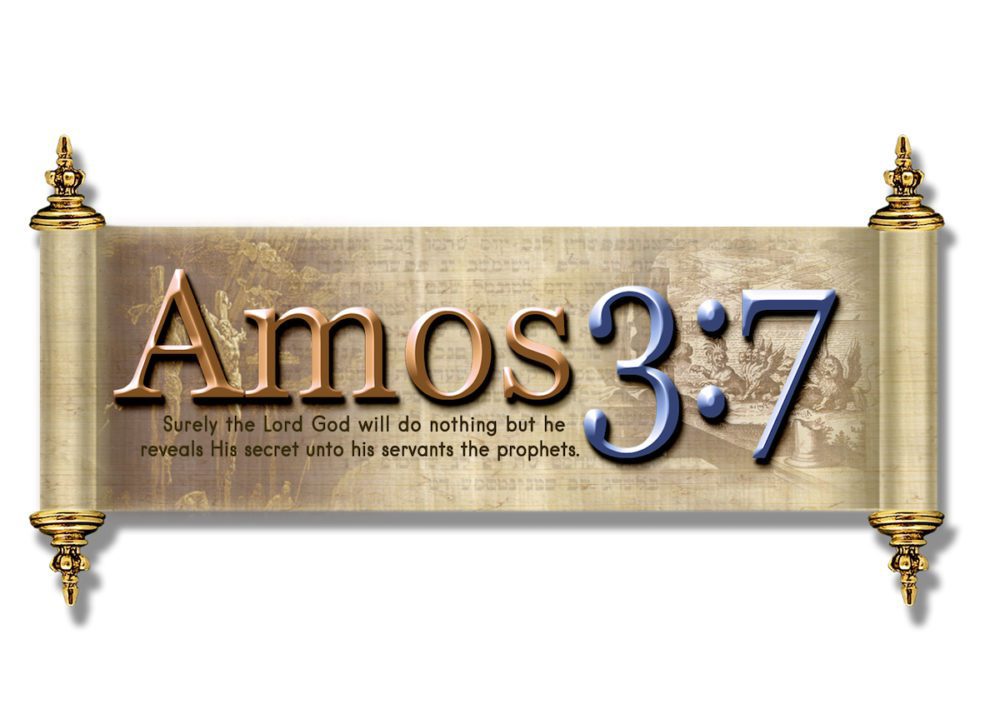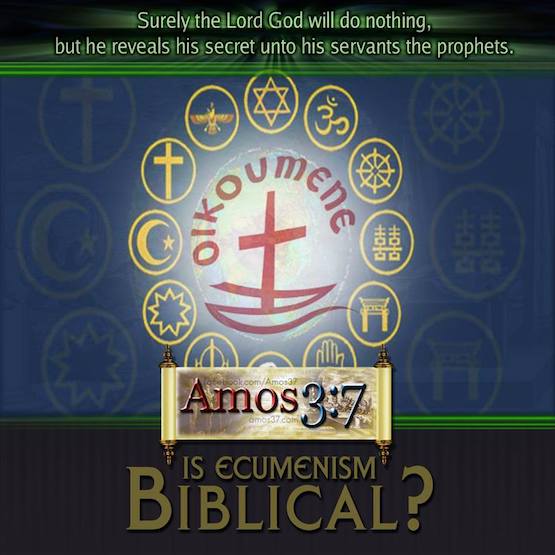As seen with the publication of Evangelicals and Catholics Together, there is a major emphasis in our day on ecumenical unity among Evangelicals and Roman Catholics. Those who promote such unity state that both are Christian and both are viable, God-honoring systems of faith. But clearly, the substantial differences between the two groups render ECT a ridiculous document. Biblical Christianity and Roman Catholicism are two different religions that practice and believe different things….
“Is ecumenism biblical? Should a Christian be involved in the ecumenical movement?”
Answer: Walter A. Elwell, in The Concise Evangelical Dictionary of Theology, defines ecumenism as “The organized attempt to bring about the cooperation and unity among Christians.” On an international level, the World Council of Churches represents ecumenism when it states its purpose this way (as taken from its website: www.wcc-coe.org): “The World Council of Churches is a fellowship of churches which confess the Lord Jesus Christ as God and Savior according to the scriptures, and therefore seek to fulfill together their common calling to the glory of the one God, Father, Son and Holy Spirit.
Examples of Ecumenical Fellowship: The ECT
It is a community of churches on the way to visible unity in one faith and one eucharistic fellowship, expressed in worship and in common life in Christ. It seeks to advance towards this unity, as Jesus prayed for his followers, ‘so that the world may believe’ (John 17:21).” On a national level, a document called Evangelicals and Catholics Together: The Christian Mission in the Third Millennium, published in 1994 and endorsed by some rather prominent representatives of Evangelical Christianity and Roman Catholicism, is another example of ecumenism.
[bctt tweet=”A document called Evangelicals and Catholics Together: 20 Years Later, is it biblical?”]
Freemason Facilitating Mystery Babylon
Important Questions About Ecumenical Ventures
The important question is this: Are ecumenical ventures right and biblical? Should we be involved with other “Christians” in joint ventures, either locally, nationally or internationally? The answer to this question is not black and white. As is almost always the case, one must weigh out the answer in each situation specifically. However, there are a couple of biblical guidelines which will help us make God-honoring decisions regarding ecumenism.
First of all, Are those we are joining with truly Christians in the biblical sense of the word? Many people and organizations in America and the world “name the Name of Jesus Christ” and even state He is Lord and Savior and yet clearly reject what the Bible says about Him. Obvious examples of this are Mormons and Jehovah’s Witnesses. They will say they are followers of Jesus Christ and are Christian and yet deny with vehemence what the Bible declares concerning Christ’s nature and work. A not-so-obvious example comes in the form of liberal Christianity. Liberal Christianity is found in almost every denomination in the United States and, although it may seem very Christian, usually liberal Christians reject several essential biblical truths such as the inspiration and authority of the Bible (2 Timothy 3:16), Jesus as the only Savior of the entire world (John 14:6, 1 Timothy 2:5), and salvation as God’s free gift to those who believe apart from good works (Romans 3:24, 28; Galatians 2:16; Ephesians 2:8-9).

Evangelicals and Catholics Together?
As seen with the publication of Evangelicals and Catholics Together, there is a major emphasis in our day on ecumenical unity among Evangelicals and Roman Catholics. Those who promote such unity state that both are Christian and both are viable, God-honoring systems of faith. But clearly, the substantial differences between the two groups render ECT a ridiculous document. Biblical Christianity and Roman Catholicism are two different religions that practice and believe different things about how one is saved, the authority of the Bible, the priesthood of believers, the nature of man, the work of Christ on the cross, etc. The list of irreconcilable differences between what the Bible says and what the Roman Catholic Church says makes any joint mission between the two absolutely impossible. Those who deny this are not being true to what they say they believe, no matter which side they are on. Any Catholic who is serious about his faith will deny what a serious evangelical Christian believes and vice-versa.
Like Minded Temptations
The difficulty with ecumenism is that often the above-listed groups are passionately like-minded with biblical Christians regarding a given issue. Biblical Christians are usually marked by a strong pro-life belief, a strong traditional view of the family, a strong emphasis on compassion for the homeless and sick, and a strong desire to see justice in the world. The above groups are often marked by the same desires. Thus, the temptation to “pool resources” in pursuit of a common cause is sometimes great. This leads to the next guideline.
Second, what is the ultimate goal of this ecumenical venture? The Scriptures give clear guidance as to how Bible-believing Christians are to live their lives. Colossians 3:17 states our purpose this way, “Whatever you do in word or deed, do all in the name of the Lord Jesus, giving thanks through Him to God the Father.” Regarding our interactions with the lost, unbelieving world, Jesus states this in Matthew 5:16, “Let your light shine before men in such a way that they may see your good works, and glorify your Father who is in heaven.” Some familiar verses are Matthew 28:18-20, also known as the Great Commission, “And Jesus came up and spoke to them, saying, ‘All authority has been given to Me in heaven and on earth. Go therefore and make disciples of all the nations, baptizing them in the name of the Father and the Son and the Holy Spirit, teaching them to observe all that I commanded you; and lo, I am with you always, even to the end of the age.’” In summary, all that we do is to bring glory and honor to God. Regarding the lost of this world, Christians bring glory to God when God uses the believer to further His kingdom through evangelism and discipleship. This is to be the motivation of the Bible-believing Christian’s interaction with the world.
Regarding ecumenical ventures, we need to ask ourselves whether or not these goals are being pursued. Often, in our day, the political and/or social desires of the participants are the driving motivators behind an ecumenical venture. A prime example of this is the current drive to pass a constitutional amendment declaring that the only marriage that will be recognized in the United States is the traditional, man/woman union. If our churches ecumenically join together in pursuit of this goal (passing out fliers, hosting a rally, etc), how are we striving for the above stated biblical purposes? Are we not simply striving for political and social achievement? How will the practicing, unbelieving homosexual view our Savior and Lord if all he sees in us is political activism and no compassion and no outreach? The ultimate goal of our actions should be the salvation of lost sinners, which we once were (Ephesians 2:1-3). The Bible tells us that the angels of heaven rejoice over one sinner who repents (Luke 15:10). There is no passage that declares that the angels rejoice when a law is passed. This applies to homosexuality, abortion, drug abuse, etc. God is glorified when we demonstrate Christlikeness to the lost. As we contemplate ecumenical ventures within our society, we need to make sure the venture is one in which God’s kingdom is expanded through pursuing the lost with the gospel, be they practicing immorality, abortion-rights activists, homeless, drug abusers, criminals, etc.
In conclusion, should we be involved in ecumenical cooperation with other Christians and churches? If the above conditions are met in a God-honoring way, we may freely and joyfully join with other believers in pursuit of God’s kingdom. The ultimate goal is God’s glory and the evangelism and discipleship of the lost. The ecumenical venture must be structured in this way. Thus, those we join with must believe the biblical definition of the gospel and they must also be about seeking the same goal of God’s glory and the salvation of the lost.
Article Source Got Questions.org
Connect with Amos37
Stay up to date with Amos37.com eMail update (Weekly)
Free Resources for the growing Christian.
“But grow in grace, and [in] the knowledge of our Lord and Saviour Jesus Christ. To Him [be] glory both now and for ever. Amen.” 2 Peter 3:18
Blue Letter Bible Free Online Bible & Study Tools & Commentaries
Bible Classes College Level For Free to Enroll Track your progress.
Our Own Free Discipleship Course In Video HD.




















Would this scripture not apply in this case ?
And he said to them, ‘An enemy has done this!’ The slaves said to him, ‘Do you want us, then, to go and gather them up?’ 29″But he said, ‘No; for while you are gathering up the tares, you may uproot the wheat with them. 30’Allow both to grow together until the harvest; and in the time of the harvest I will say to the reapers, “First gather up the tares and bind them in bundles to burn them up; but gather the wheat into my barn.”‘”
I sometimes think that the “First Gather Them in Bundles…” takes time & maybe what we are witnessing today.
Thanks for your comments Nicole.